City dwellers are taking advantage of empty homes in the Beijing suburbs. Christine Low reports.
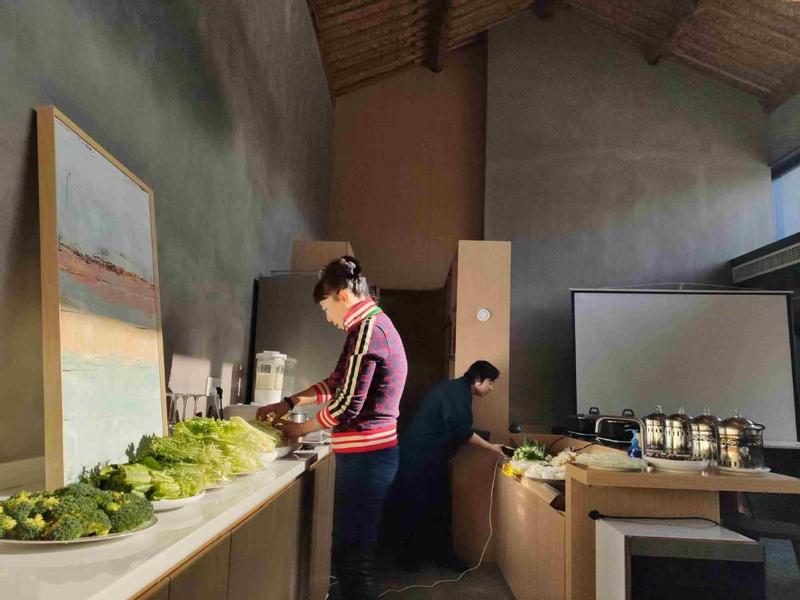 Zhang Chi, front, an employee of Zhuang Homes, prepares vegetables for hotpot ahead of a house viewing at the Little Tavern in Zhangjiazhuang village, Beijing, in December. (WANG JING / CHINA DAILY)
Zhang Chi, front, an employee of Zhuang Homes, prepares vegetables for hotpot ahead of a house viewing at the Little Tavern in Zhangjiazhuang village, Beijing, in December. (WANG JING / CHINA DAILY)
In Miyun district on the outskirts of Beijing, Zhang Chi moved around a modern Nordic style house with sunlight streaming through its wide windows and sliding doors. She was overseeing renovation work at the Little Tavern, Zhangjiazhuang village, to improve the experience of clients wanting a taste of modern rural life.
Zhang is an employee of Zhuang Homes, a company that works with farmers to rent out their unoccupied village homes to city dwellers looking for weekend retreats or quiet sanctuaries.
I want to have a life that is free. A life that I myself really want … an enriching life. I don’t want to be confined to my house every day
Zhang Chi, an employee of Zhuang Homes, which facilitates rentals on the outskirts of the capital
As farmers continue to migrate to cities to find jobs and leave their rural homes empty, Zhuang Homes hopes that its business model will help China's villages realize the potential of their unused homes and make rural communities vibrant again.
In December, Zhang was hired by the company to manage the Little Tavern, which is one of the farmer homes that the company remodeled to rent out. The 48-year-old is in charge of house viewings, and stays at the house three or four days a week to ensure that everything is taken care of whenever there are promotional events.
However, when COVID-19 struck in January, Zhang had no choice but to leave the tavern on the eve of Spring Festival due to restrictions that only allowed residents into the village.
Suburban warmth
Zhang heard about the company from a friend, and attended an organized tour with her husband to one of the villages in a Beijing suburb in October. She was attracted to the rental homes as the atmosphere reminded her of her childhood.
"In the past, when we were children-about 5 or 6 years old-in Beijing, we lived in single-story houses and relations with neighbors were very good," Zhang said. "Now that we have grown up and have been living in multistory buildings for many years, we don't even know who our neighbors are."
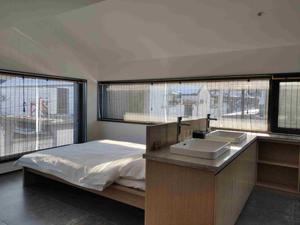 A bedroom in a Zhuang Homes rental property with a view of Zhangjiazhuang village. (WANG JING / CHINA DAILY)
A bedroom in a Zhuang Homes rental property with a view of Zhangjiazhuang village. (WANG JING / CHINA DAILY)
Zhang and her husband have discussed many times what they will do when they are older as life in the city is too fast paced and high pressure.
They have considered a piece of land in the outer suburbs that they can call home and plant vegetables and flowers.
For her entire life, Zhang has lived and worked in Beijing. She used to work as an operations manager for sports clubs, but has stayed at home for about six years after quitting her last job. However, when the opportunity to work at Zhuang Homes arose, Zhang was eager to return to work. The fresh air, mountain backdrop and running water in the village were welcome bonuses.
It is also the warmth of people that has attracted Zhang to suburban life. Whenever she needs help, the "aunties and older sisters" in the village do not hesitate to offer assistance. One morning, Zhang cut her hand, and after she called her neighbors they quickly gave her a bandage. She said that kind of neighborly spirit is not something you see when you live in a multistory building in the city.
During the COVID-19 lockdown, Zhang said she really missed village life. "For each and every person who has been to the Little Tavern, there is not one person who does not dearly miss life there," Zhang said. "It's really a life of freedom."
Zhang Ruirong, a 63-year-old farmer who lives behind the Little Tavern, is one of two villagers helping Zhuang Homes to maintain unoccupied rental homes.
She quickly became friends with company staff and was eventually hired to help with the housekeeping. In a village where the average age is more than 60, Zhang Ruirong said that the locals are happy to welcome new arrivals.
"As the villagers like to say, 'If there is someone living in a house, there is vibrancy. If there is no one living in the house, there is no vibrancy'," Zhang Ruirong said.
As Zhuang Home employees got to know the villagers better, they also helped promote fruit that residents like Zhang Ruirong grow as their main source of income.
Whenever the company has promotional events or house viewings, the employees encourage the villagers to bring their fruit over and sell it to the visitors from the city.
Yang Fan, deputy general manager of Zhuang Homes, helps promote the villagers' organically grown produce. As the produce is inexpensive and high quality, Yang said she and other city dwellers are happy to buy it.
"Produce like this is hard to sell in remote areas, so we want to do an urban-rural exchange," Yang said. "And we bring these goods to the city people, who find this a novelty."
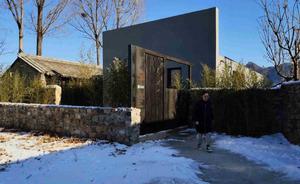 A Zhuang Homes employee walks outside a renovated home in the village in December. (WANG JING / CHINA DAILY)
A Zhuang Homes employee walks outside a renovated home in the village in December. (WANG JING / CHINA DAILY)
Land reform innovation
Zhangjiazhuang village is almost a two-hour drive from the northern part of Beijing's Third Ring Road, and it is hard to believe that Scandinavian-style modern homes can exist in the middle of a farming village.
The concept is the brainchild of Zhuang Homes' founder and CEO Zhong Quefei, who studied and worked in agricultural land management for several years. Her knowledge and experience helped her come up with the novel idea of transforming village homes and renting them to city dwellers looking for quiet hideaways.
It not only allows farmers to earn extra income from rentals, but the renters are also then free to use the property as they wish, including for commercial purposes. The rented homes can be used for elderly care, homestays, artist's spaces or even subleased out.
The idea gained impetus when Zhong was doing her master's in land management at Renmin University of China in Beijing and after China introduced land reform measures.
Under the household contract responsibility system adopted in the early 1980s, the property rights of rural farmland are divided into two layers: the ownership right that is collectively owned by a rural community, normally a village; and the usage right, which is held by an individual household that contracts a piece of farmland from the village.
In 2014, the government began reexamining land-use policies and launched a pilot program to explore ways to let farmers transfer land-use rights in exchange for income.
This resulted in farmland being put on the market for rent by the end of 2016. Zhong estimated that idle farmland in China amounts to 8.67 million hectares, the equivalent of 300 million farmers not using their land.
"Where did they go?" said Zhong, referring to the farmers. "They've gone to the cities, they are living in the cities."
"However, there are also people who have lived all of their lives in the city and want to go to the suburbs to explore new spaces."
Zhong said those looking at land reform needed to explore what advances can be made for villagers to increase their incomes. With the opening of land usage rights, Zhong visited villages to explore what type of projects would meet the requirements.
As the farmers' land cannot be sold, Zhuang Homes helps the farmers rent the dwellings for a "middle man's" fee. Zhuang Homes helps remodel some of the farmers' houses, but other renters prefer to do their own renovations.
Zhong calls the practice gongxiang nongzhuang (sharing village homes with city people).
She also has personal reasons for developing the business model. When she was young, Zhong lived with her grandmother in a village and has since witnessed development in rural places lag behind cities. Zhong has bettered herself living and working in the city and feels an obligation to promote advancement in the villages.
In 2016, her company developed an app so farmers can easily participate in the renting process. Potential customers log on to the Zhuang Homes app to find a place they are interested in renting. Once customers have selected one, the company helps arrange a rental agreement between the customer and the farmer. The customer can then move into the rented home after a waiting period of three to six months.
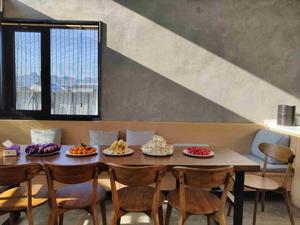 A corner of the dining room at the Little Tavern. (WANG JING / CHINA DAILY)
A corner of the dining room at the Little Tavern. (WANG JING / CHINA DAILY)
Wide spaces
Zhong said that the business-in terms of the number of customers closing deals with the company-has grown at an annual rate of 300 percent since 2016, with more than 1,000 such homes successfully rented so far. They started renting properties early last year after renovations were completed.
The company has about 60,000 customers to date, with daily queries reaching about 4,000 to 5,000.
Zhuang Homes' customers include authors, artists, architects and professors seeking places where they can work in peace.
The high rental costs in the city mean renting a spacious property in a village can help lower costs for entrepreneurs starting their own businesses or people working in creative industries.
"Some artists have told me real estate developers in the cities cannot give such large spaces to them," Zhong said. "They will only give large spaces to those businesses that can afford the rental costs-for instance, commercial businesses like cosmetics and retail businesses. They will not reserve the space and give it to those in the creative industries, and neither will they give you a space that is 8 meters high."
Yang Bin, a 62-year-old researcher from the Chinese Academy of Social Sciences, is one of Zhong's customers.
The retired professor has always been interested in being closer to nature. He found out about Zhuang Homes when he was doing research online and thought that it was a good project. Together with some friends, Yang Bin has rented a village house in Beijing's Huairou district for about a year from Zhuang Homes.
"I believe this is a very forward-thinking business that has been realized in practical terms," Yang Bin said. "If this is done well in the future, it will have a very big effect on our country."
As an economics researcher, he is also interested in the project from an academic perspective and sometimes accompanies the company's employees to observe how it renovates the homes it will rent out.
However, as much as Yang Bin thinks it is a good idea, his busy city life has kept him from going to his rented village house as often as he would like.
"In my experience, everyone has their own schedule. Even though we feel that it is a good place, we still have our own personal and work lives, so the usage of the house is not very high," he said.
He has plans to share the rented property with a larger pool of people by putting it up for rent online.
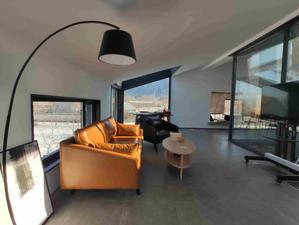 A view of the living room in the refurbished home, with farmland outside. (WANG JING / CHINA DAILY)
A view of the living room in the refurbished home, with farmland outside. (WANG JING / CHINA DAILY)
Safe haven
The novel coronavirus pandemic helped to greatly increase Zhuang Homes' number of sales enquiries and new customers.
Despite not being able to organize house viewings, the company had a big surge in the number of customers and also closed more deals than before the pandemic. More people realized the value of a comfortable village lifestyle in relative isolation.
Zhong said the company is expanding its business to other parts of China including Shenzhen, Guangdong province, Hangzhou, Zhejiang province, and Hainan province. With about 200 million village homes across China, the business potential is huge.
As for Zhang Chi, she was finally able to go back to the Little Tavern in mid-May and welcomed customers for house viewings. "Since returning to the tavern, every day has been bright and beautiful," Zhang Chi said. "I can finally 'breathe' freedom, not needing to wear a face mask where it has now become a requirement in the city. I can enjoy life to my heart's content in the village."
Retirement plans for her and her husband and their two dogs in the near future will most likely include renting a house in the suburbs with friends.
"Whatever it is, I want to have a life that is free," Zhang Chi said. "A life that I myself really want … an enriching life. I don't want to be confined to my house every day".
Contact the writer at christinelow@chinadaily.com.cn


